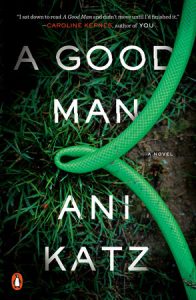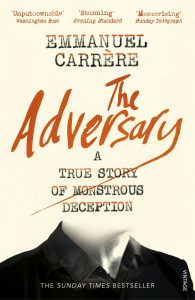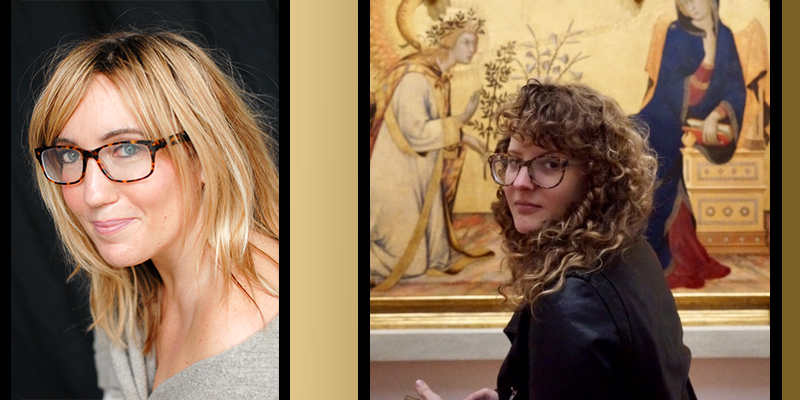Caroline Kepnes is the author of You, Hidden Bodies, and Providence. You and Hidden Bodies (which were adapted into the hit Netflix series You) are narrated by “nice guy” Joe Goldberg. When we meet him in Kepnes’ first novel, he is a snarkily erudite bookstore manager, equal parts romantic and cynic, who longs for the perfect, all-consuming relationship with aspiring writer Beck, the object of his obsession. Determined to possess her, Joe will stop at nothing to get what he wants and what believes he deserves, even if it means disposing of a few worthless bystanders along the way.
Ani Katz’s debut novel A Good Man is a character study of a man undone by the unrelenting expectations of contemporary masculinity. Narrator Thomas Martin is a successful advertising executive and devoted family man whose perfectly-ordered universe includes his apparently docile wife, Miri, his tween daughter, Ava, and his adult sisters, the overly-sheltered twins Deedee and Kit. Haunted by his abusive childhood and the loss of his older sister Evie, Thomas stakes his entire identity on being a protector and provider. When his life begins to spiral out of control, he is driven to acts that shatter his sense of self.
Kepnes and Katz take to their inboxes to discuss toxic masculinity, class anxiety, social media, unreliable narrators, and more.
WARNING: Spoilers for A GOOD MAN and YOU (the novel) abound throughout the conversation.
 Ani Katz: I’m really interested in Joe’s class anxiety as an animating force, and how this potentially sympathetic dimension of his background becomes an excuse for his misogyny and violence. Thomas, my protagonist, is also motivated by feelings of inadequacy; he’s obsessed with giving his wife and daughter everything that he didn’t have growing up. Both men also have a history of abuse in their childhoods. They blame everyone else for their suffering, but won’t take any blame for perpetuating these terrible cycles.
Ani Katz: I’m really interested in Joe’s class anxiety as an animating force, and how this potentially sympathetic dimension of his background becomes an excuse for his misogyny and violence. Thomas, my protagonist, is also motivated by feelings of inadequacy; he’s obsessed with giving his wife and daughter everything that he didn’t have growing up. Both men also have a history of abuse in their childhoods. They blame everyone else for their suffering, but won’t take any blame for perpetuating these terrible cycles.
Caroline Kepnes: I’m so happy that you brought up class anxiety. That’s one of many reasons I connected with your book, with Thomas and of course, with his sisters. We’re writing stories about murderous men who pass as upstanding citizens. Why? It’s a fascinating aspect of human development, when a young person starts to realize where they stand in the world in terms of economics, societal norms—note to self: time to reread The Glass Castle—and it’s always on my mind. With Joe, I think to myself, he was taught to feel inadequate and ashamed. Unfortunately, it’s a common part of coming of age. Thomas, growing up, wants to “save” his sisters, one of whom is being sexually abused by their father, and the other two are being sheltered to the point of not developing as adults. His need to succeed in the workplace is relatable on a level because he’s got this Achilles Heel about his familial identity. He’s not “crazy”, he’s right about a lot.
Thomas and Joe don’t recover from the self-pity part of the cycle. They dwell in it. At times, when you’re immersed in their perspective, you don’t like that you understand where they’re coming from. They’re flawed, often horrible, but society is flawed, often horrible. Can horrible flawed characters make the horrible, flawed world a better place? Why do they think they know what’s best? Thomas and Joe never let you forget that they are keeping track of all the petty and larcenous crimes they endure that go unnoticed, unpunished, tolerated. Then you have to be like, wait, but that doesn’t give you the right to…and they hit the mute button on you and carry on. They are trespassing in plain sight, taking full advantage of their physical attributes.
Mark Roberts hosts a podcast and he remarked that Joe really knows how to lift himself out of the doldrums, that this is an undeniably appealing trait in a person. It’s also useful. And that made me think about A Good Man. Thomas got the short end of the stick in many respects (hence the billy club). I think of that line The Big Chill: “I don’t know anyone who could through the day without one or two juicy rationalizations. They’re more important than sex.” Your book taps into that dread, the sense that he who rationalizes is armed with inverted compassion that will eventually negate all his good intentions.
AK: One of my favorite parts of You is the novel’s recurring motif of Hannah and Her Sisters. Woody Allen’s Upper West Side (especially that film) as a symbol of this ideal intellectual New York life rings so true to me. You’ve said in the past that Joe doesn’t want to win these people over, but does he long for some of what they have?
CK: Absolutely. I remember the first time I saw that movie when I was in elementary school. Those people onscreen…they were all so uptight! But at the same time, I wanted to spend Thanksgiving with them. Then I’d think eew, no I don’t. Years later, when I was living in Los Angeles, romanticizing the good old days in New York and starting to write You, I was like okay, I had geography on my side. I grew up on Cape Cod, and most of the well-to-do people are only there in the summer. What would it be like to be in Joe’s shoes, to have this grim home, grim life, and watch that movie and realize it’s all so close, but so far away? Do you put on a costume and try and sneak in or do you it burn it down? It’s a classic debate in countless stories, and I felt that same tension in Thomas. Can you talk about designing his workplace, what it’s like to function in an office setting where emotionally, financially, you feel like an interloper?
AK: In some ways, Thomas in his workplace was one of the most challenging parts of the novel for me to write, because it deviated so completely from my own professional experience. All my jobs have been teaching-centered (in schools, museums, or as a private tutor), and so I’ve never spent meaningful time in a corporate office. Even though I knew those work scenes would take me well out of my comfort zone as a writer, I understood they were completely necessary in order to bring Thomas fully to life in all his dark complexity. I did a lot of research on blue chip advertising firms, and drew on secondhand stories about what it’s like to work in that kind of environment. Corporate life seems so absurd in so many ways, and there’s a dehumanization in punching the clock and following these frequently nonsensical orders from on high, even once you ascend the ladder.
While I’ve never worked in that kind of office, I have had a wealth of professional experiences that have put me in close contact with corporate masters of the universe—I definitely understand that feeling of being an interloper. In my years as a private tutor, working in the homes of the extremely rich, I found myself consciously playing up certain class-marker elements of my background (I went to an Ivy League school! My family goes to Fire Island too! I also see the New York City Ballet Nutcracker every year!) in order to avoid feeling like such an inferior, disempowered person.
 CK: Ahahahha we are twins in that way! I went to Brown and I was an SAT tutor for a very tiny while. It’s strange to be an Ivy League graduate panicking about student loans while you tutor a teenager with a bedroom bigger than your apartment. I would tell the parents that I was from Cape Cod and the parents would light up and tell me about their summer house there or their vacation and I’m like mmmm not quite the same thing, I scooped your ice cream and sold you your ferry tickets and possibly bussed your table at Chili’s. But you feel those people wanting you to be just like them.
CK: Ahahahha we are twins in that way! I went to Brown and I was an SAT tutor for a very tiny while. It’s strange to be an Ivy League graduate panicking about student loans while you tutor a teenager with a bedroom bigger than your apartment. I would tell the parents that I was from Cape Cod and the parents would light up and tell me about their summer house there or their vacation and I’m like mmmm not quite the same thing, I scooped your ice cream and sold you your ferry tickets and possibly bussed your table at Chili’s. But you feel those people wanting you to be just like them.
It’s an authority puzzle. We created these male characters who don’t play well with others and have issues in the workplace, to say the least. My parents had a small business, and I was so excited to work when I was a kid. I got a job the second I could. But then I remember it dawning on me, oh, I have a boss. When you babysit, the parents leave. But when you’re scooping ice cream, there is this manager telling you you’re doing it wrong. WTF? You see that “working man” indignation in both Joe and Thomas. I don’t think either could have put their identity issues aside to be SAT tutors.
AK: Indignation is right. My creation of Thomas and his work life also owes a lot to my maternal grandfather’s history. He grew up extremely poor, and lost his father suddenly when he was very young, and he worked as an ad man before starting a career in real estate. Like Thomas, he was dedicated to his work; he felt he had a lot to prove, and he wanted his family to have a completely different lifestyle than what he’d had. But while my grandfather was able to achieve the life he wanted and reconcile both his pride and his joy, characters like Thomas and Joe reflect the awful contradiction of the striving interloper: thinking that it’s all terribly hollow bullshit while also having a desperate need to be acknowledged as the absolute best and smartest person in the room.
There’s this passage from Hilary Mantel’s novel An Experiment in Love that I return to a lot when exploring ideas of class in my writing: “There are people who find life hard and those who find it easy. There are those who have a natural, inbuilt, expectation of happiness, and there are those who feel that happiness is not to be expected: that it is not, in fact, one of the rights of man.” This suggests that if you grow up immiserated, you learn not to expect happiness. Are Joe and Thomas different? Do they see happiness as being owed to them? Are they entitled in their rage?
“Joe is an equal-opportunity abuser….He’s always operating in that grisly social territory counting the ways we slyly hurt each other.”—Caroline KepnesCK: Joe is an equal-opportunity abuser. He doesn’t think of himself as someone who hates women or hates men. He’s always operating in that grisly social territory counting the ways we slyly hurt each other. He holds others accountable for those passive aggressive things they said and did. He doesn’t lust for blood. He’s not the mad man we recognize at first glance, running through the streets arbitrary killing people with a machete. He’s not wearing a NO FAT CHICKS T-shirt. He’s just…some guy. We might even like him if we got stuck talking to him at a party.
Thomas is similar that way. He’d tell you what a good guy he is, and you’d agree that he loves his wife, his daughter, he goes out of his way to provide for his extended family. We all know that there is no excuse for murder. (I felt queasy every time I saw the words “billy club” in your book.)
That’s why Hilary Mantel’s words ring so true. Some people endure trauma and become empathetic. Others become embittered. Maybe the survival instinct is inborn, maybe it’s activated by an outside force, be it a mentor or an influence. But with Thomas and Joe, we are reminded that survival isn’t necessarily fair. I thought about this a lot in Paul Tremblay’s Cabin at the End of the World, too. A character I love dies, it breaks my heart, and sadly, it feels true to the world. In your book, I was rooting for Thomas when it was time for him to pitch a new ad campaign, one as brilliant and exploitative as most ads these days. I liked his idea and that made me uncomfortable in the most stimulating way. There’s this part of us that longs to see those who have suffered find happiness and success, and for those who have done wrong to seek redemption, and I guess I like to pick apart that part of us. Would you say that you’re interested in that compulsion to crave redemption as well?
AK: Absolutely. Despite his claims to the contrary, and his repeated insistence that he’s not looking for sympathy, Thomas is obsessed with his own redemption. He wants to be redeemed for what happened in his childhood, especially his inability to protect his sister Evie from abuse. He also wants to be redeemed, or at least excused, for what he does to his wife and daughter. He tries so hard, and he’s had to dig himself out from such a deep hole to get where he is, so who can blame him for experiencing his failures as such earth-shattering catastrophes? I’m really fascinated by characters who are so thoroughly convinced of their own goodness that they refuse to consider the ways they harm others, and who harbor this poisonous belief that good intentions are enough.
Joe seems desperate for the perfect relationship as a way of making up for the love that he missed out on all his life. Because of this, he becomes obsessed with building these closed, codependent worlds of two people. Thomas is likewise fixated on building the ideal family that he didn’t have. Of course, the problem is that, when you believe you’ve built something on your own and for yourself, then the people involved become your possessions that you can control and dispose of as you please.
“When you believe you’ve built something on your own and for yourself, then the people involved become your possessions that you can control and dispose of as you please.”—Ani KatzCK: So true! That’s a message that is everywhere around us. You are what you eat. Avoid toxic people. Write the book you want to read. In essence, your happiness is on you but also…everyone on the planet is here to make you happy. There’s a narcissistic underbelly in there because collectively, it’s possible, if you’re a Thomas or a Joe, to decide that your well being is the top priority at all times, that it’s your job to “pick” the right people and dispose of them if they don’t behave as you want them to behave.
I wrote You before the word “ghosting” was a thing the way it is now, but “ghosting” as a verb always gets to me—the idea that if you’re not into someone, if someone’s not into you, they are dead to you. With Thomas and Joe, they take it to the next level. That person who failed to live up to their expectations and projections is literally dead. As I write this I’m like wow, look at all that passive language, as if Thomas and Joe are not killing the people themselves. It’s always fascinating to me to read a book like yours, where I’m slowly pushed onboard a ship and it’s not so much that I can’t jump off, it’s more like okay, I’m here, I want to see how things work in this mindset.
 AK: I’m really fascinated by the use of passive language in these situations. I owe a great debt to Emmanuel Carrére’s book The Adversary, a work of reportage about Jean-Claude Romand, who pretended to be a doctor for nearly two decades before the walls of his lies closed in and he murdered his family. That book is full of Romand’s own testimony, and it’s incredible how much he removes himself from his own actions just through his use of language. He sees himself “not as someone who had done something horrific but as someone to whom something horrific had happened,” and he speaks about the murders that he committed as this external tragedy that befell his family. There’s an especially poignant moment toward the end of the book, when Carrére realizes that Romand has finally referred to his wife by her own name after years of elision. Similarly, Thomas constantly references “my girls,” and as the novel progresses refers to them not as Miri and Ava, but only as “my wife” and “my daughter.” He doesn’t use their names anymore, as if they’re not people; they only exist in relation to him. In You, very often she’s not Beck, she’s just “you,” and “you” needs an “I” to exist.
AK: I’m really fascinated by the use of passive language in these situations. I owe a great debt to Emmanuel Carrére’s book The Adversary, a work of reportage about Jean-Claude Romand, who pretended to be a doctor for nearly two decades before the walls of his lies closed in and he murdered his family. That book is full of Romand’s own testimony, and it’s incredible how much he removes himself from his own actions just through his use of language. He sees himself “not as someone who had done something horrific but as someone to whom something horrific had happened,” and he speaks about the murders that he committed as this external tragedy that befell his family. There’s an especially poignant moment toward the end of the book, when Carrére realizes that Romand has finally referred to his wife by her own name after years of elision. Similarly, Thomas constantly references “my girls,” and as the novel progresses refers to them not as Miri and Ava, but only as “my wife” and “my daughter.” He doesn’t use their names anymore, as if they’re not people; they only exist in relation to him. In You, very often she’s not Beck, she’s just “you,” and “you” needs an “I” to exist.
CK: I was so aware of Thomas’ attempts to erase their names and their humanity as means to extricate himself from the intimacy. And you nailed it about “you”. There’s an inherent codependency in that dynamic, the same way that there is possessive detachment in “my wife” and “my daughter”. All of these phrases can be just fine on Hallmark cards, “To my wife. To my daughter…Happy Birthday to you”. But we add our handwriting to the card to personalize it, to put the name in writing. You’d never not make the card your own, because the recipient would be confused. It wouldn’t feel right. Even when you say “happy birthday” on Facebook, that person knows it was you because there’s your digital signature, your face.
AK: The digital surveillance of women is an important means of maintaining control for both Thomas and Joe. Why is that? Do performances on social media turn people into fabrications? When a man sees a woman as being “fake,” does it become that much easier to see her as extensions of oneself?
CK: Do you remember Friendster: A Place for Friends? I was obsessed with that word at the time. Friendster. (n) Derives from friend, is kind of like a friend, but the bond is electronic and permanent unless someone on either side of that friendster-ship actively deletes said bond. Interaction required to maintain bond: none. It’s on another level with women because it transforms every day as an opportunity to present yourself to the world. The man looking at the pictures is going to have reaction, but then there’s part two, where the voyeur-friend-stranger gets to privately analyze the intentions of the person behind the profile. So you think you look good with your hair like that? You pose with your friends, you want me to think you’re popular. You didn’t get that many Likes when you posted a photo where you look a little drunk so now you’re posting a picture of a book you’re reading to remind us that you’re also smart.
I know I over-think all of this, but it’s just so much fun to analyze the machinations. Objectification culture is nothing new, of course, but now we have platforms that are open 24/7. I built Joe as someone who consciously objects to all of it, the lurker who won’t put himself out there because he’s “above it” but will spend several hours dissecting your innocent, understandable attempts to share your life with the world. To get back to Thomas, I felt his self-consciousness on every page. It plays so well for me in these times when we have access to details of so many more people’s lives than we did before social media.
AK: I started college in the fall of 2004, so my friends and I were all immediately sucked into the black hole of Facebook (I especially remember judging people by how they designated their political views when the choices were only Very Conservative, Conservative, Moderate, Liberal, and Very Liberal), but I have vague memories of Friendster. Such a strange term!
For Thomas, social media is important in relation to Miri’s portrayal of their family life when Ava is young; he allows his wife to do the work of projecting that ideal image of their lives through this carefully curated gallery of idyllic moments. Later, when Ava becomes a tween, he sees social media as a danger. He hates that his shut-in sisters are so closed off from the world, but at the same time he’s horrified when his daughter dares to exist on the internet. The threat of her becoming an autonomous person and making the stupid mistakes that plenty of adolescents make is intolerable to him. His views change in respect to Miri, as well; he has always believed that he knows everything about her, and that her life revolves around the family, but then he sees he may be wrong. It’s not even that she’s having an affair; just the fact that there are details that he doesn’t have access to is unacceptable. At the same time, he’s trying to make his living by capitalizing on the constant connectedness that social media provides.
CK: That’s the opera of the story. “I think my daughter is this way but she’s telling me and the world she’s that way. I have to remember that what I see isn’t real, and if I don’t like what I see I can’t do anything about it, because that’s her right.” Yeah, Thomas can’t bear it. He’s in a losing battle. It’s the scary thing about all of this newfound connection. He can’t burn down the Internet…his advertising job is the Internet, to an extent. It’s something I thought a lot about while I was writing Providence too, the way social media allows for this false sense of closeness with people.
With Thomas, with Joe, readers watch social media drive these men over the edge. It’s not that simple, of course. We know that these characters are flawed and would be damaged in any era, but stories about online boundaries and identities are exciting to me right now because of all the new toys/emotional torture devices. In another time, Joe would have encouraged Beck to put her address on a mailing list for the bookshop, and things might have ended there. In any case, Thomas and Joe are both “sensitive”, and we’re exploring the concept of male sensitivity in this world where it’s become so easy to see things that might hurt us. Everyone isn’t built to be online every day, but it’s all there at all hours, every day, all day. Thomas and Joe can’t delete the technology.
“Everyone isn’t built to be online every day, but it’s all there at all hours, every day, all day. Thomas and Joe can’t delete the technology.”—Caroline KepnesAK: Connoisseurship is very important to these men (literature for Joe and opera for Thomas). They’re also both connoisseurs of art that their childhood abusers also loved, which seems to suggest an inability to separate taste from behavior in their influences. With Joe, there’s also this wonderful specificity to his cultural and social observations, which seems to indicate an intense love-hate relationship with the world. Their knowledge of highbrow culture seems to give them a sense of self, and can also be employed as explanatory devices to excuse their behavior. But, as you’ve said in the past, “You can still be an asshole if you read books.”
CK: I couldn’t get enough of Thomas’s pride in his love of opera, and his genuine love of opera. It reminded me of the architect in Hannah and Her Sisters. It’s natural for us all to make connections, to think that liking EXAMPLE A means that he’s an EXAMPLE A type of guy. But humans aren’t that simple. We never were. I also clicked with the opera in A Good Man because you really captured that part of him that cannot quite live in this world. It’s dangerous for Thomas to have found something he loves so much because that love is invigorating and it lifts him out of his darkest moments and empowers him and entitles him and then that love becomes a dangerous, enabling force. Well done there because you captured the way music elevates the soul…and the billy club.
AK: Thank you! I come from a very musical family, and we often listened to opera broadcasts on long car trips and on weekends. This was passed down from my grandparents, who genuinely adored classical music of all kinds but who also saw musical appreciation as one of the cornerstones of a cultured, upper middle class life. In some ways, being an opera fan represents a confluence of education and wealth. Thomas inherited his love of opera from his father, who was responsible for the decline and end of the family’s fortune. Though Thomas tries to cast himself as being very different from his father, his love of opera is evidence of his father’s legacy (it’s no coincidence that the rest of the family never listens to it anymore, only Thomas). It is a tonic that gives him meaning in moments of darkness, but it also inflates his sense of the histrionic. His favorite opera, Tannhauser, is all about the sacrifice of a pure woman’s love in the service of a fallen man’s absolution.
Joe and Thomas are both deeply unreliable narrators. In Thomas’ case, his delusions are so deep that the truth doesn’t even occur to him. He just blocks out whatever he doesn’t want to see. I get a similar sense from Joe, but he’s also so frighteningly good at manipulation. Does he realize he’s gaslighting people? Or, like Thomas, is he so convinced of his own goodness that he only sees himself as a victim?
CK: I love that phrase: “The truth doesn’t even occur to him.” That was on my mind a lot in the beginning with Joe and it’s there in every book, especially the one I’m working on right now. I understand the moral imperative of confession, the desire for that person who harmed you to own up to what they did. The fun of Thomas and Joe is that they own their truth all day long. It’s just not what you or anyone reading would necessarily agree to be the truth. Both would not enable comments on their social media posts, you know? They are not looking to debate the validity of their perspectives and there is certain appeal in that when you’re reading because they are their own best friends.
Joe doesn’t realize he’s gaslighting. He wouldn’t see it that way. He thinks his version of the story is the only one that matters because, as we know, he’s the only one who sees things clearly. Thomas’s self-idealism was compelling for me because he was so convincing. He’s an expert salesman and he bought into his self-esteem along time ago, and you brought us inside of that sale. I’m also curious about that process. I just know that I got so excited every time we went to visit his sisters. I made Joe an only child because I liked the idea of him lacking a witness in his position to confirm or deny his descriptions of his upbringing. Those sisters moved me and they’re still with me. What would writing Thomas’s story and psyche have been like if he’d had brothers?
AK: Even though Thomas has more witnesses who are in fact quite intimately acquainted with what happens, he rejects their version of the truth; his version of the story is the only one that matters. His sisters are my favorite characters in the novel; in some ways, they’re the heart of the story, and their humanity comes through in all its weirdness even though Thomas doesn’t acknowledge it. I wanted to populate his world with women, because it makes sense that he feels this strong urge to be a provider and protector, but I’m actually totally enthralled by the idea of him having brothers. Would it have been harder to assert himself as the man of the house? Would he have respected them more? More likely, I think he would have cast them with their own severe flaws: they’re too much like their father, or they’re too weak. What if he’d had a son? (Ah, what a missed opportunity, I now think to myself!) Gender is important to the dynamic of his relationships, but at the same time I think Thomas’s particular toxicity transcends it, just like how Joe is an equal-opportunity abuser.
Similar to what I hoped to accomplish with Thomas’s sisters, I love that, even with Joe in the narrative driver’s seat, you consistently show the strength and resourcefulness of your female characters, while also allowing them to be extremely sloppy, flawed, and unlikable. I strongly believe that having “likable” characters is overrated and not at all necessary for a story to work. What are your thoughts?
CK: Likable is not the same thing as compelling. When I hear that word, I see Jennifer Lopez in Monster-in-Law picking up the twenty that the suit-jerk drops and tossing it in the tip jar. That’s a nice thing to do, it’s the right thing to do, and a girl like Beck would do that too…but then she might tweet about what she did to score points and share the moral high and seem like a good, likable girl because oh boy, is there a lot of pressure on both women and men to do good, to be seen doing good.
I don’t need to like a character I’m reading about. I just need to care about that character, maybe be a little afraid of that character, a little mad at them and mad for them. It’s exciting to see women that are likable and unlikable (you know, like most humans). Joe is impossible to please. He’s never going to like a woman so much that he’s incapable of ending her life. That potential is inside of him and it’s been realized. That’s the whole point for me, that the word likable, the notion of being likable empowers the outsider in a disturbing way. It means you that should care what they think of you, which implies that their opinion, their power is paramount, critical to your well-being. It’s a paradoxical part of our reality. No one can ever be good enough or smart enough to be spared the wrath of someone who expects to be disappointed, who needs to be disappointed because that’s a self-fulfilling prophecy, a comfort zone that must be protected at all costs.
AK: One criticism I’ve gotten about A Good Man is that Thomas is too obviously repulsive and not at all sympathetic, and that as a result there’s not enough moral ambiguity in the story. Conversely, a lot of your readers really adore Joe. How do you feel about this? Joe is magnetic and antiheroic, but is he endearing and appealing? Do you think readers crave the idea of the “everythingship”? Do they just enjoy living through him vicariously, bloodlust and all?
CK: Did I read the same book as the critics? Books are special because of the way you bring you mind into that book, and that’s where one piece of writing advice I like is the idea that you pick one person to write for. It’s not about that person. It’s about you specifying your reach, your intention, your strategy. I’ve certainly encountered readers who say that they didn’t like Joe the way you’ve encountered people that don’t like Thomas. I would say that I loved reading about Thomas, venturing into his soul. He was thoroughly there on the page, in my mind, and as a reader, I love that feeling. I’m not a psychologist visiting him in a cell.
Reading is a unique experience. I understand when people read the Joe books and fall into a fucked up kind of love with Joe. A book is a safe place. He’s a fictional character and he can be charming, and some people find him funny. I don’t think it’s the murder that gets people, it’s the misguided danger of his passion. It’s a meme: “Find someone who loves you like BLANK loves BLANK”. Joe can be very romantic. In real life, we’re constantly told that love is flawed, that you can’t expect anyone to be perfect. Loving Joe is taking that advice and running with it in a fictional space and discovering how that makes you feel, rationalizing your “love” for a serial killer. I’m lucky to have met and talked with readers over the years, and they’re all smiling when they say they love Joe, in this guilty grin sort of way.
“It can be comforting to believe that these kinds of unthinkable acts can only be perpetrated by someone is truly “crazy,” but the really chilling fact is that there never seems to be a silver bullet to explain the inexplicable.”—Ani KatzAK: In writing Thomas, I kept coming back to the question of psychopathy and the idea of the mask of sanity. But in my research on family annihilators, the idea of the psychopath never seemed like a sufficient explanation. It can be comforting to believe that these kinds of unthinkable acts can only be perpetrated by someone is truly “crazy,” but the really chilling fact is that there never seems to be a silver bullet to explain the inexplicable. Instead, there almost always seems to be a variety of factors that still don’t add up. How do you see the idea of psychopathy in relation to Joe? Other characters call him crazy, psycho, sick. Is he? Or is it flattening him too much to just call him a psycho?
CK: If only it were that simple, right? I like to let characters call Joe a crazy psycho because we have all been called a name at some point that we feel is unjustified, or just flat out wrong. You’re not always going to empathize with Joe or Thomas, but these are “sensitive” men and it’s a way of unpacking the complicated nature of said sensitivity. It’s exciting to be in that wounded mind when it’s under fire. And it’s so true. There is no silver bullet. I take the morals and the diagnostics out of the equation when I’m building characters. Why is Beck humping a green pillow? Because she’s humping a green pillow. Why is Joe capable of murder? Because he’s capable of murder. All I hope to do is create characters who are walking around undiagnosed, untagged and see what happens when they bump into each other. Why do they pass? How do they pass? That’s why I loved it whenever Thomas was at work. You amplified the dread, building up to his outrage at being called out for behavior that he did not “own”.
AK: I think a major part of the intellectual project that we’re both engaged in is rethinking the role of the reader in consuming stories like these. We’re so oversaturated with entertainment that showcases violence (especially violence against pretty white women), but usually there’s a detached or outsider point of view without agency that keeps readers/viewers at a safe, voyeuristic distance, and ultimately doesn’t really challenge them to think about how they’re implicated in what they’re consuming.
For those reasons, I felt very strongly that Thomas needed to narrate his own story. The reader doesn’t get a comfortable place to watch what he wreaks; they’re right there with him. In this way, the reader shares his agency. They have the choice to turn away, but I think that most often they probably won’t, and my hope is that their resulting discomfort will make them question their desire for these kinds of stories.
You do something very similar in your work. Can you talk about what inspired you to take that approach?
CK: All of this is so well said. We are exposed to violence every day (sometimes in real time, if we go on Twitter during a mass shooting). The imagery, the noise, compounded by the ever-present platform on which to share your response as something is happening is wearing on people. Reading is refreshing. When you’re reading a book, your hands are holding the pages or the tablet. Your mind is in one place and how nice for our hyper-stimulated brains to have that break from the bombardment and the juxtaposition of all these incongruous images and headlines.
I started writing about Joe Goldberg in 2013 when I was in a rough patch. I’d spent two years watching my vibrant, funny father die a slow death while my mom did everything she could to stop it as she dealt with her own health issues. It was a house of horrors but it was also a house of love. It was hard to reconcile those memories. I was finding my way in this new world where my dad would not be calling to tease me, where my brother wouldn’t get to talk about the Red Sox with him, where my mom was alone. My dad’s voice was inactive and Joe’s voice was in my head like, So your dad had cancer and he died. We’re all going to die. It’s not a big deal. That’s why death is often a blessing, because some people are in too much pain to be here. Anyway, enough about you. Let me tell you about ME…
Then there’s all the work of figuring out the story, rewriting it over and over. But it’s always fun to reminisce about that little spark that starts the fire. How did you clarify Thomas’s drive?
AK: That’s such a powerful and poignant genesis story. For me, the spark that started the fire was learning about a tragedy that happened several decades ago in the extended family of a close friend—a partner murder-suicide. I kept thinking about this story; in my neophyte’s writing brain, at first I thought that it would function as the “juicy” part of a multigenerational family saga, but I found myself interrogating that impulse. Why did I want to tell this story? What was actually compelling and upsetting about it to me? Why did I keep thinking about it?
What really stayed with me was how the family talked about their son, and how he was both remembered and not remembered. I started reading about family annihilators, and I was struck by how these perfectly comfortable, mundane lives suddenly go off the rails so violently and so publicly; there are so many cases where the day before they were all having fun at a neighbor’s barbecue or a company Christmas party. It was such an intimate kind of horror that really scared me, and I wanted to get inside that intimacy and fear. I felt that the best way to get inside was to embody that voice.
Readers have no escape from these narrators. As a writer, it can take a toll being in that character’s head, and you’ve experienced that dynamic for much longer than I have. What’s it like to live in that headspace and return to it again and again?
CK: I mean I was “with Joe” for the past three days while writing, and when I go to the coffee shop and overhear things my brain goes haywire because I’m hearing what he would have to say about that. It’s a wonderfully surreal thing, this other person living inside of you, right? And it’s so true about the escape factor. Read our books and surrender because that’s kind of the point. These people can’t escape their addled brains, and you can’t either. I always think about those virtual reality goggles. They scare me so much, the idea that you would choose to block your vision of your surroundings to enter another realm. That was my hope with Joe, that letting him pull you in would be a little like that. And that’s certainly how I felt with A Good Man.

















